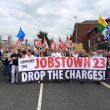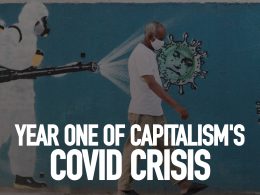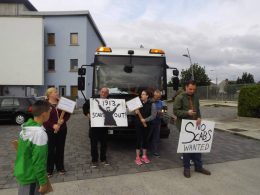By Solidarity Councillor and Socialist Party member Michael O’Brien
If a “not guilty” verdict is returned at the end of the Jobstown protest trial it will be an occasion for celebration by working class and left activists throughout the state. In our “post-match” analysis of key moments in the trial where the credibility of the prosecution case was shaken it’s likely that Karen O’Connell’s recorded remarks referring to the local protesters as the “fucking dregs” will stand out among the lowlights.
It would be a mistake to see Karen O’Connell’s words as an aberration. The very fact Joan Burton did not take her up on those insults there and then are a clear indication that this is how a section of the working class is viewed by the Labour Party leadership.
Guardian columnist and author Owen Jones is not a friend of the radical left these days. However many of us would recognise that he was on to something when he wrote his breakthrough book in 2011 entitled Chavs – The Demonisation of the Working Class.
The central theme of the book is exposing a certain type of stereotyping by the pro-establishment media of the most disadvantaged stratum of the working class in a manner designed to excite feelings ranging from scorn to outright contempt in the reader or viewer. Think of the Channel 4 documentary Benefits Street and its TV3 Irish imitator Dole Cheats and you get the idea.
There is a political purpose underlying these portrayals. They serve first and foremost to sew a major division within the broad working class itself. That section of the working class in relatively stable employment, be that low or middle income, is encouraged to divert its gaze away from the robbery of the bankers and bondholders. Instead they are told to look upon those who are unemployed or relying on some form of welfare support or who live in council accommodation or who are on the public housing waiting lists as being the major source of society’s problems.
Conversely working class people in employment are then encouraged to see themselves as being comparative “solid citizens” with something in common with the establishment in opposition to the unemployed.
Tied up with this is a culture of blaming people who are unemployed for their predicament and insinuating that they are living too comfortably on the benefits they receive.
Once this atmosphere of division and prejudice is established and solidarity between the employed and unemployed weakened it then lays the basis for attacks on welfare payments and “activation” measures like Jobbridge which we saw on Joan Burton’s watch as Minister for Social Protection.
Former Minister Joan Burton’s public utterances defending the above policies were phrased as positively as she could manage as being necessary motivators to incentivise people to find work. However this is just the varnish that was missing from Karen O’Connell’s unguarded remarks in the Garda car.
Leo Varadkar’s current billboard and bus ad campaign on so called “welfare fraud” is all about perpetuating that prejudice and playing to the gallery of the Fine Gael rank and file ahead of their leadership election. The false figures he presents are a precise repetition of claims made by Joan Burton when she held the Social Projection portfolio.
Significant advances have been made in pushing back against the open expression of extreme prejudice against people on a range of grounds in recent decades. In the Channel 4 documentary It was alright in the 70s shocked young people were shown some of what passed for mainstream entertainment on British television in the 1970s where racism, sexism and homophobia were par for the course.
In one sense we’ve come a long way thanks entirely to movements and campaigns of those groups in society who were the very victims of prejudice. We need now to stand up to the stereotyping and hate speech directed against the unemployed and poor with similar vigour.












